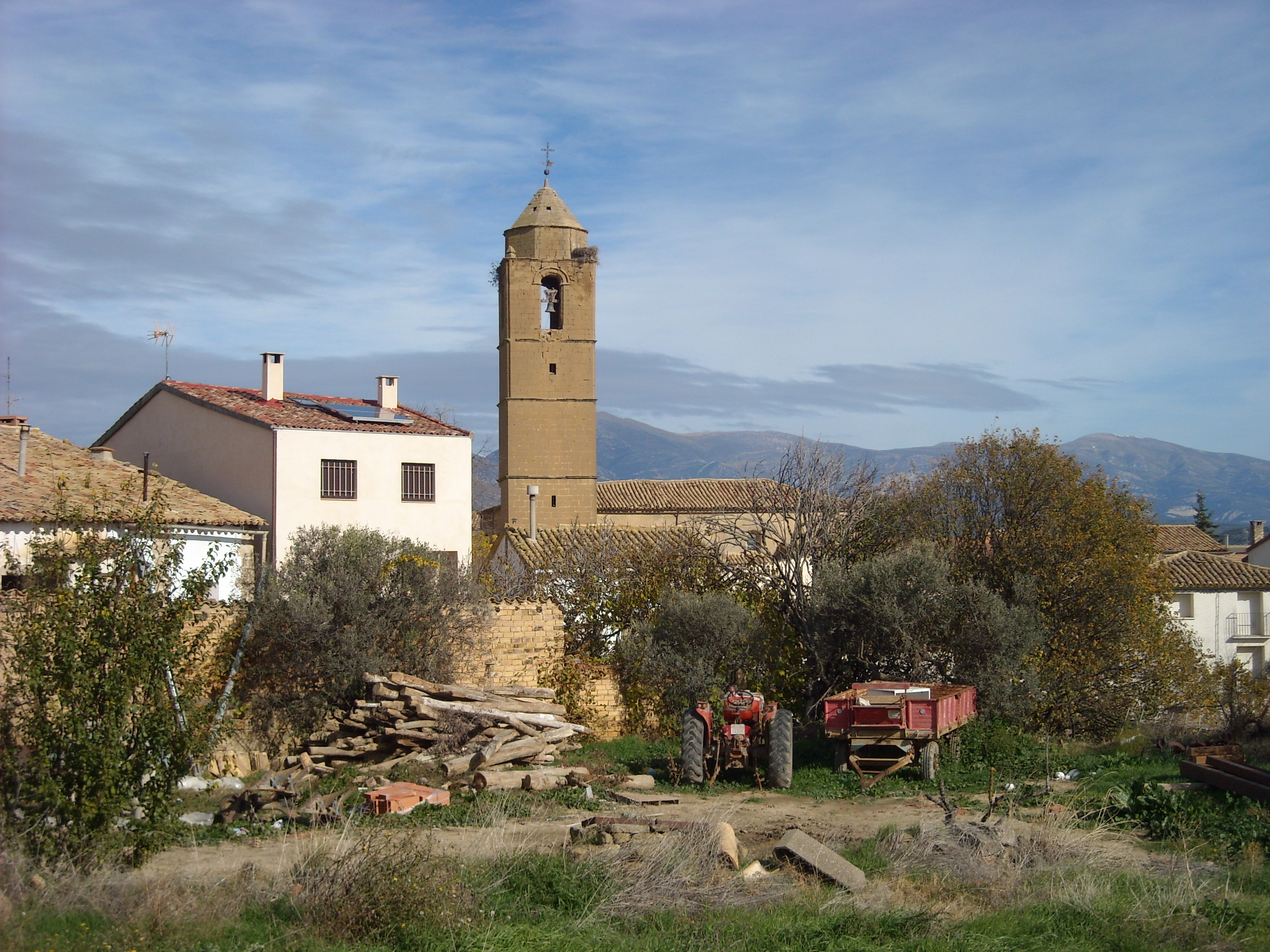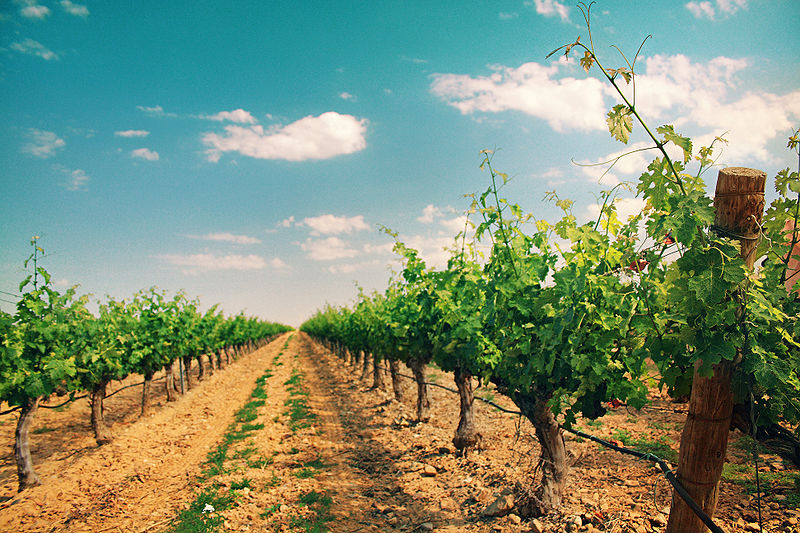Jorge Luis Bail is the first representative of a green party to be elected mayor of a Spanish village. In light of this, how is climate change affecting rural villages in Castilla Y León and Aragón?

Jorge Luis Bail is an ecological activist from Huesca in Aragón, an autonomous community which borders both Catalonia and France and is one of the areas in Spain most gravely affected by rural depopulation.
Formerly a member of the Spanish parliament for the ecological political party Equo, last August he was elected as mayor of Loporzano, a small village with a population of around 500 in the province of Huesca, making him the first representative of a green party to become the elected mayor of a Spanish village.

As such, he has a wealth of knowledge about the climatic issues which rural Castilla Y León and Aragón are facing and could yet face.
“The future of Aragón will be unequal in terms of who has and hasn’t been able to prepare themselves for these crises,” he explains.
Rural depopulation vs climate change. Which is worse?
At the start of 2020 the president of Extremadura’s Partido Popular – the main right-wing opposition party – argued that rural depopulation is a more serious problem for his autonomous community’s villages than climate change.

Environmental activists such as Jorge Luis Bail have pointed out, however, that when addressing chronic issues such as rural depopulation and climate change, it is not a case of either or.
“I think that the villages which have allocated an important part of their resources to be able to decrease trends of depopulation, whilst also anticipating the effects of climate change and easing them (such as through a long-term investment in water or energy) will have more chances of survival,” he says.
Spain at particular risk of climate change
Spain, like its neighbouring Mediterranean countries, is at particular risk to environmental and ecological change.
By 2050, according to an article written in El Independiente a few years ago, heatwaves in Madrid would see the capital’s temperature rise to levels akin to those in Marrakesh, Morocco.
At the start of 2020 the president Pedro Sánchez declared a climate emergency, stating that he wanted Spain to achieve climate neutrality by 2050.
Whilst climate change experts and campaigning groups welcomed these measures, there are still a multitude of potential environmental problems which Spain may yet face, according to Greenpeace (quoted in National Geographic).
And if these are not addressed, regions such as Aragón and Castilla Y León could be adversely affected over the following decades.
Aragón
“Aragón is extremely vulnerable to climate change. More concretely, the Pyrenean Observatory of Ecology has informed us that the Pyrenes will lose half of its snow, which is a lot more in skiing terms, in 30 years if they do not take any measures to combat climate change,” says Jorge Luis Bail.
This could have devastating impacts on the tourism industry in Aragón and thus the region’s local economy.
Indeed, 2019 saw Aragón break its record level of tourist figures, with around 3.8 million people visiting and over 8 million overnight stays, as reported in El Heraldo.
Whilst the Coronavirus pandemic has, at least in 2020, had a negative effect on tourism across Spain, climate change could, over the next few decades, have an even greater impact on the country.
“We are going to have a lot of problems and many new ones in a short space of time and the population is not prepared,” says Jorge Luis Bail.
“Climate change still isn’t a political priority, we see this in the extension of Castanese, in the concessions of new plans of irrigation, in a PAC (the EU’s Common Agricultural Policy) which is doing nothing to change the intensive model, and in capitals which don’t stop growing,” he adds.
“Cities will increase their population meanwhile villages depopulate, but with more problems. Capital cities such as Zaragoza and Madrid will keep going without seeing the consequences, which means they will take longer to deal with the issues,” he continues.
Rural Spain’s climate problems
Although climate change is a global and national problem, rural Spain has its own specific environmental challenges.
“The main environmental challenges for rural Spain are the lack of water in general (especially in certain regions of the country), the changes in water patterns (floods and droughts), the contamination of aquifers (use of pesticides) and the consequences of the use of transgenic seeds and crops,” says Beatriz Felipe, a researcher at the Tarragona Centre for Environmental Law Studies.
“We should consider that those who live in rural areas have closer contact with the environment than those who live in the cities. Frequently, their labour has links with agriculture or cattle raising, both of which are extremely affected by climate change,” she adds.
Youth in action against climate change.
Spain’s Fridays for Future group, Juventud por el Clima, are trying to take action for their generation.
They argue that cattle-raising and agriculture are greatly affected by the environmental challenges posed.
They also argue, however, that certain farming techniques are exacerbating the various environmental issues.
“Rural Spain is increasingly threatened by projects of huge farms which are very damaging for animals in social, environmental and welfare terms,” says a spokesperson.
“In social terms, huge farms imply an unfair competition to small farmers, since they work with many more animals than in traditional cattle raising,” they explain.
“Also, those who work in these huge farms, many of whom are migrants, don’t have good working conditions. The pandemic has demonstrated this with the outbreak in Binéfar,” they add.
In environmental terms, it is argued that these huge farms impact water resources, resources which in some areas are scarce.
“By the way, we can’t forget that cattle-raising is one of the sectors which produces the most greenhouse gases,“ they say.
“Finally, in terms of animal welfare, these animals live in awful, crowded conditions and, in many cases, with serious health problems, “ they add.
Climate Change affecting wine production
Since rural Spain is heavily reliant on industries such as agriculture and the production of wine for its local economy, the impact of meteorological phenomenon is tantamount for the population’s ability to both survive and thrive in these areas.
Moradillo de Roa is a village located in the province of Burgos in Castilla Y León and between 2000 and 2018 its population decreased from 231 to 172.
Counting on almost as many bodegas – cave-like cellars where alcoholic drinks such as wine and beer are freshly stored in hispanic culture – as people, like many other villages in the province, it is economically and culturally dependent on the cultivation of red wine.
According to World Stop Exports in 2019 Spain was the third biggest exporter of wine worldwide, making just over $3 billion for its economy.
Vino tinto, – red wine – as the 2001 Estopa song goes, is an ingrained part of Spanish lifestyle and the national economy.
“It’s our culture,” states Javier Arroyo Rincón, the mayor of Moradillo de Roa.
“Moradillo is the perfect synchronisation between the past, the present and the future,” he adds.
Situated just 17 kilometres from Aranda de Duero, which was named European City of Wine for 2020, Moradillo de Roa is part of a provincial and regional hub for wine-making which coalesces around the Duero river.
“The connection between Moradillo de Roa and wine might come from the past, but it is demonstrating that it has a lot to do with its future. It is a wine which reflects the land it is made in,” Augustina González Alonso who works for Bodegas Moradillo de Roa, states.
However, as reported in Euro News, a rise in temperature could make wine cultivation practically impossible by 2070.
Alongside environmental impacts, recent trends of rural depopulation has meant that, between 2014 and 2018, villages in the Ribera del Duero wine region saw their population decrease by around 1000 people, as reported in Burgos Conecta.
And whilst climate change is not the only factor behind trends of rural depopulation, environmental issues do little to help this traditional industry.
The repercussions of climate change.
“What occurs is that that change will be worse in some questions which until recently we were not concerned about, such as having to be alert (and worried) for the reduction in biodiversity (which protects us), the taking off of new illnesses and human plagues and in crops, and a price increase of things we don’t value right now,” says Jorge Luis Bail.
Another problem over the coming decades will be an increase of climate change refugees if villages are no longer habitable.
“When we talk of climate change migrants, we are talking about people who leave their home for various reasons, one of which is the influence of, directly or indirectly, the impact of climate change,” states Beatriz Felipe.
“Actually, in many regions of the world there are people who are already migrating from rural areas towards the cities in search for better life opportunities since droughts and recurring floods are, for example, affecting the crops on which they depend,” she adds.
But Jorge Luis Bail argues that there are ways for Aragón’s villages to deal with these environmental challenges.
Climate change can be solved
“Villages in Aragón will have to be creative; but they have tools such as being in contact with food sectors in their localities, provincial finance, projects of decarbonisation, EU funds for efficient energy, etc,” he says.
“One of the biggest political challenges of this century is to be able to marry the decisions made along with a knowledge of their consequences, something that globalization and industrialization have separated dramatically and can help to explain depopulation among other things,” he adds.
And education, argues Jorge Luis Bail, is a vital tool for the fight against climate change.
“Maybe we should start by educating young people in that humanism which puts ourselves in the planet, and not just the poles and the Amazon,” he argues.
“The biggest challenge is raising awareness, since it’s a global problem and we still haven’t advanced that much since the knowledge of the previous century; maybe it will be important to start locally,” he adds.
One such example of local rural sustainability comes in the shape of the so-called ecovillages like Matavenero, which has a population of around 60 and is located in the province of León in Castilla Y León.
Spending 3 weeks in this eco-village, Kevin Faingneart, a German photographer, found a village which shares 1 single computer and has little network connections; he found that to get phone signal he had to walk for 30 minutes.
“They hope to inspire more people to live independently and ecologically,” Kevin Faingnaert told Wired.
And these so-called eco-villages such as Matavenero are but one way that rural Spain, and Europe more widely, can become more sustainable.
However, examples of ecovillages are extremely rare and not a realistic solution to the country’s environmental issues.
“The responses to climate change should not be limited to one government, but instead they should be impulse on an international, European, national and local level, with each of these adjusting to the circumstances of each,” says Beatriz Felipe.
“Regarding the climate emergency that we find ourselves in, whose effects will increase over the next few years, it is relevant that all governmental and political organisations act in a coordinated and efficient way with the purpose of slowing down the effects of greenhouse gases and to protect the people most affected by the impact of climate change,” she adds.
The key is education
Education and implementing genuinely sustainable policies are what Jorge Luis Bail claim can, however, solve or at least mitigate these environmental challenges.
“The support of the big voices and campaigns has a symbolic reach, but in real everyday life, the local people are what really matters. In the territories it is indispensable that new rurality’s are created, and not exclusive ones such as caciquism and nationalism; we need solidarity but with a global perspective, “ he says.
“It is a process of emancipation and discovery. And it is so complicated that it is nearly better to not give lessons from the ivory tower but to be informed and learn,” he adds.
He also does not doubt the difficulties which this will entail for all involved.
“When the appropriate measures are taken it will be too late for some, but I think there is still time. What is for sure is that human geography and economy of Aragón will change in the future,” he adds.
In a survey produced as research for this project, when asking 100 Spanish people about the advantages of living and working in rural Spain, nearly 80 mentioned one of the following three ideas: its quality of life, its tranquillity and or being able to live amongst nature.
Some of the respondents also suggested that the Coronavirus pandemic may lead people to return to their villages, away from crowded, populated urban cities such as Madrid and Barcelona, where the virus has hit hard.
“I hope that the pandemic has shown us that there are alternatives to living in cities, and that you can have a better quality of life in villages. The challenges are important, and governments, institutions and businesses should create plans to guarantee repopulation matching with social and climate justice,“ says the spokesperson of Juventud por el Clima.
And despite the many and latent problems associated with the environment, Jorge Luis Bail is hoping, as mayor of Loporzano, to continue his sustainability agenda in this village.
In the end, however, he also argues that we have an individual responsibility to the environment.
“In terms of how to live, each person must find their way because this means that one’s actions are genuine, effective and long-lasting.”

